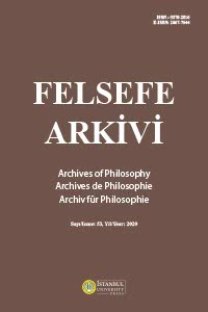Nietzsche’nin Nihilizm Söylemi
Nihilizm, pasif nihilizm, aktif nihilizm, dekadans, üstinsan
Nietzsche’s Discourse of Nihilism
Nihilism, nihilist, active nihilism, decadence, superman,
___
- Bataille, Georges. 2000. Nietzsche Üzerine, çev. Mukadder Yakupoğlu. İstanbul: Kabalcı Yayınevi.
- Baykan, Fehmi. 2000. Nietzsche'nin Felsefes. İstanbul: Kaknüs Yayınları.
- Bull, Malcolm .2013. Anti-Nietzsch, çev. Murat Bülent Tokdemir. İstanbul: Doruk Yayınları.
- Çakın, Melodi.2015.”Nietzsche ve Heidegger'de Metafizik Sorunu”. Yüksek Lisans Tezi. Hacettepe Üniversitesi Sosyal Bilimler Enstitüsü.
- Çevikbaş, Sebahattin.2010. “Nietzsche ve Nihilizm Kalkanına Yaşamın Yadsınmasını Kazımış Bir Felsefe.”Atatürk Üniversitesi Sosyal Bilimler Enstitüsü Dergisi, 2010
- Dok, Birol .2015. Nietzsche'nin Nihilizmi. Ankara: Birleşik Yayınları.
- Hançerlioğlu, Orhan.2016. Felsefe Sözlüğü. İstanbul: Remzi Kitabevi.
- Heidegger, Martin.2002. The Word of Nietzsche: ‘God is Dead’, Critical Assessments. Translated. by Daniel W. Conway. London: Routledge.
- Kranz, Walther .1994. Antik Felsefe. çev. Suad Y. Baydur. İstanbul: Sosyal Yayınları.
- Mengü, Mehmet.2006. “Friedrich Nietzsche'nin ‘Tanrı Öldü’ Sözü ve Bunun Modern Felsefi Düşünüş İçinde Kapladığı Yer.” Yüksek Lisans Tezi. Ege Üniversitesi Sosyal Bilimler Enstitüsü.
- Nietzsche, W.Friedrich.2011. İşte Böyle Dedi Zerdüşt. çev. Sadi Irmak. İstanbul: Kabalcı Yayınları.
- Nietzsche, W. Friedrich .2005. Putların Batışı: Ya da Çekiçle Nasıl Felsefe Yapılır. Mustafa Tüzel. İstanbul : İthaki Yayınları.
- Nietzsche, W. Friedrich.1968. The Will to Power. Translated. by Walter Kaufman; R.J. Hollingdale. New York: Vintage Books.
- Nietzsche, W. Friedrich.2008. Ahlakın Soykütüğü Üzerin., çev. Aslı Yarbaş.İzmir: İlya Yayınları.
- Nietzsche, W. Friedrich. 2008. Deccal; Hıristiyanlığa Lanet. çev. Ayça Kaya. İstanbul: Say Yayınları.
- Nietzsche, W. Friedrich.2014. Güç İstenci çev. Nilüfer Epçeli. İstanbul: Say Yayınları.
- Nietzsche, W. Friedrich. 2007. İnsanca, Pek İnsanca I. çev. Mustafa Tüzel. İstanbul: İthaki Yayınları.
- Nietzsche, W. Friedrich.2004. İyinin ve Kötünün Ötesinde, çev. Ahmet İnam. İstanbul: Say Yayınları.
- Örnek, Süleyman A.2012. Nietzsche'de Yaşama Sorunu. İstanbul: Belge Yayınları.
- Özkan, Senail.2004. Nietzsche: Kaplan Sırtında Felsefe. Ankara: Ötüken Yayınları.
- Türk Dil Kurumu Sözlüğü.1998. Türkçe Sözlük, Ankara: Türk Dil Kurumu Yayınları.
- Vattimo, Gianni.2005. Nietzsche ile Diyalog. çev. Durdu Kundakçı. Ankara: Dost Kitabevi Yayınları.
- ISSN: 0378-2816
- Yayın Aralığı: 2
- Başlangıç: 1945
- Yayıncı: İstanbul Üniversitesi
Yeryüzü ile Yeni Bir İlişki: Biyosantrizm ve Derin Ekoloji
Schopenhauer’ın Yeter Sebep İlkesinin Dörtlü Kökü Üzerine
Varlık ve Hiçlik Bağlamında Jean-Paul Sartre’ın Estetik Teorisi
Hilbert, Matematiğin Temelleri ve Görü
Nietzsche’nin Nihilizm Söylemi
Walter Benjamin Düşüncesinde Teknik: İmkanlar, Eleştiri ve Politik Eylem
